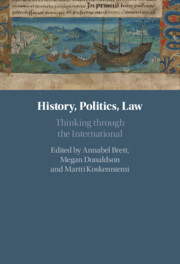Book contents
- History, Politics, Law
- History, Politics, Law
- Copyright page
- Contents
- Acknowledgments
- Notes on Contributors
- Introduction History, Politics, Law
- Part I Methods, Approaches and Encounters
- Part II Thinking through the International
- Law and Constructions of the Political
- Empires, States and Nations
- Institutions and Persons
- 9 The [In]Hospitable World
- 10 Ventriloquism in Geneva: The League of Nations as International Organisation
- Economics and Innovation
- Gender
- Index
9 - The [In]Hospitable World
from Institutions and Persons
Published online by Cambridge University Press: 28 September 2021
- History, Politics, Law
- History, Politics, Law
- Copyright page
- Contents
- Acknowledgments
- Notes on Contributors
- Introduction History, Politics, Law
- Part I Methods, Approaches and Encounters
- Part II Thinking through the International
- Law and Constructions of the Political
- Empires, States and Nations
- Institutions and Persons
- 9 The [In]Hospitable World
- 10 Ventriloquism in Geneva: The League of Nations as International Organisation
- Economics and Innovation
- Gender
- Index
Summary
From Late Antiquity the customs and institutions of hospitality facilitated the development of global connectivity. The institutional landscape of pre-modern Eurasia coalesced around customs of hospitality. Wayfarers could expect to receive food and lodgings in the monasteries, hospitals, and fondacos that laced the pilgrimage and trade routes that criss-crossed Eurasia and interwove different world religions.1 These institutions of hospitality provided sustenance for strangers in need. These strangers could be foreign travellers, merchants or pilgrims, or they could be the poor, who had become strangers in their own society through their poverty and were forced to look for support beyond family networks. However, while nominally providing simply for those in need, hospitality in fact provides a framework for the mediation of a variety of exchanges and, most importantly, facilitates the construction and legitimation of power asymmetries. As Derrida observed, hospitality is always conditional,2 and, as this chapter will show, this conditionality can be manipulated to institutionalise power asymmetries. Hospitality is a framework for movement between: between different places, between having the basic necessities or not, and between orders of power. As such it facilitated global movement across Eurasia from Late Antiquity, and played an important role in the expansion and transformation of global interactions that took place from the sixteenth century with the opening of the transatlantic, and later transpacific, worlds. Performances of hospitality formed part of early encounter narratives, from Columbus’s meeting with the Taíno Americas to Captain Cook’s encounter with the Polynesians in the Pacific. These stories of hospitality oiling the cogs of pre-modern connectivity are haunted by the parallel stories of betrayal and the making of the colonial world, the lingering indigestion of this convivial sociality.
- Type
- Chapter
- Information
- History, Politics, LawThinking through the International, pp. 231 - 252Publisher: Cambridge University PressPrint publication year: 2021



